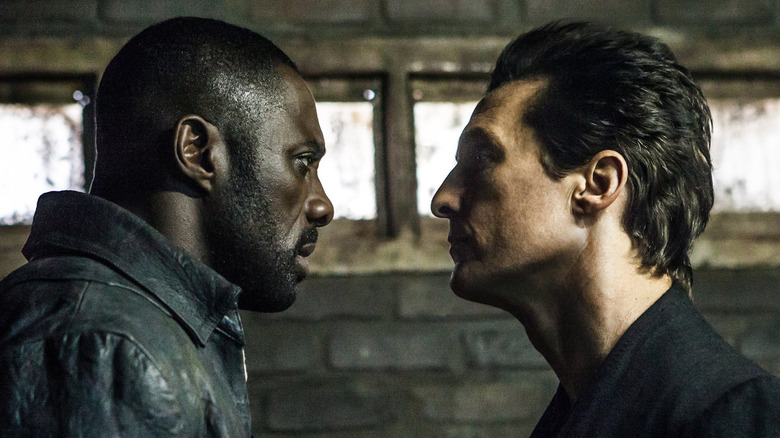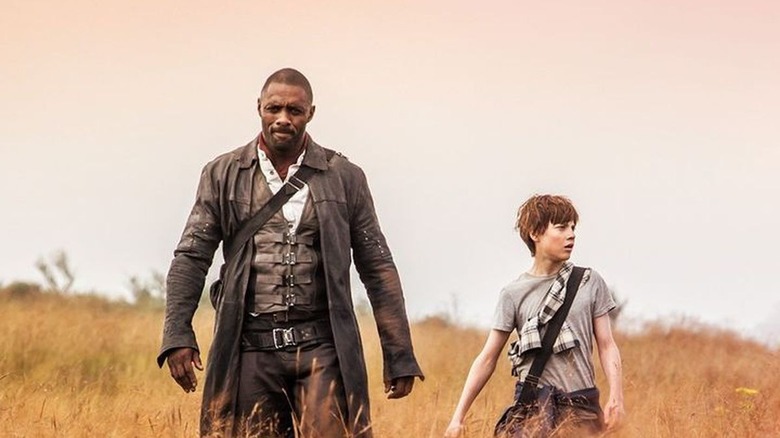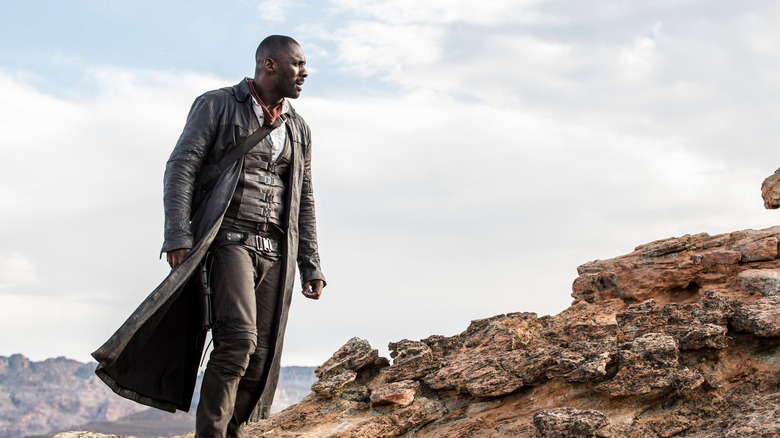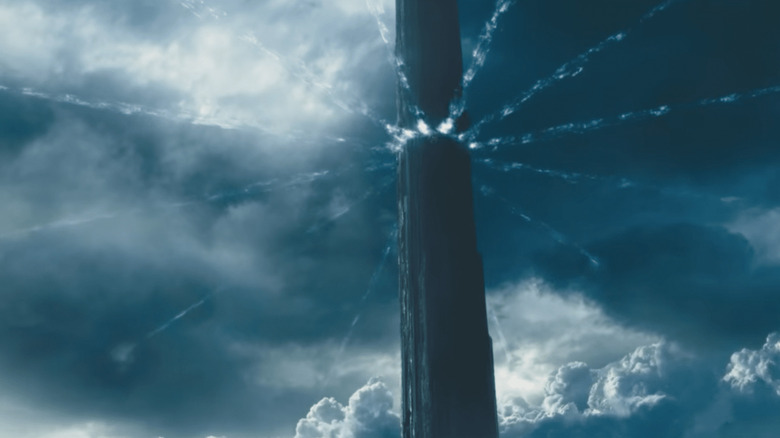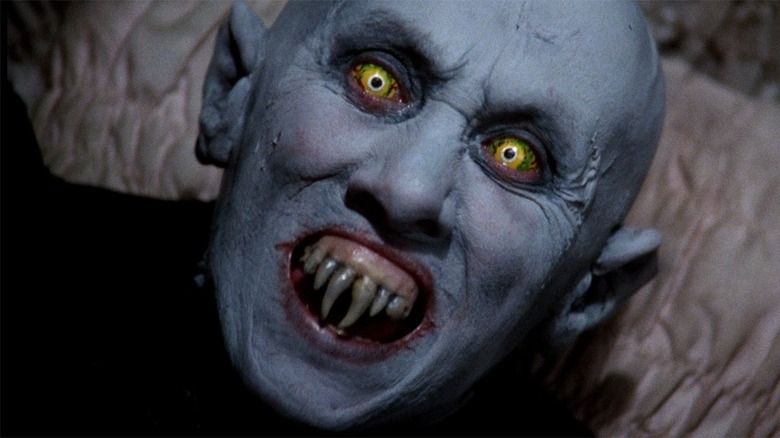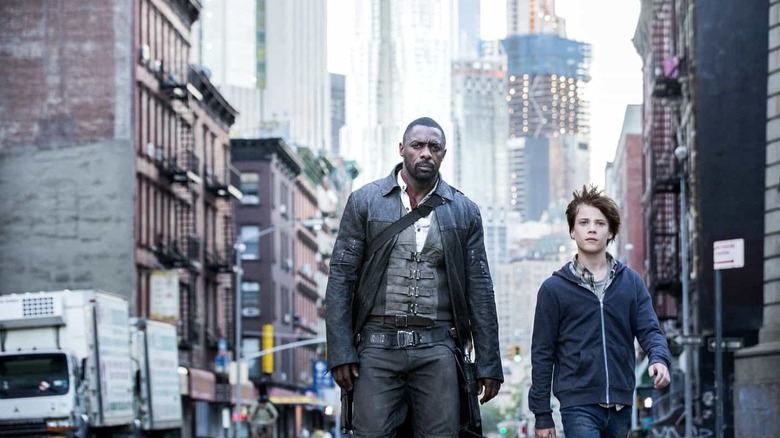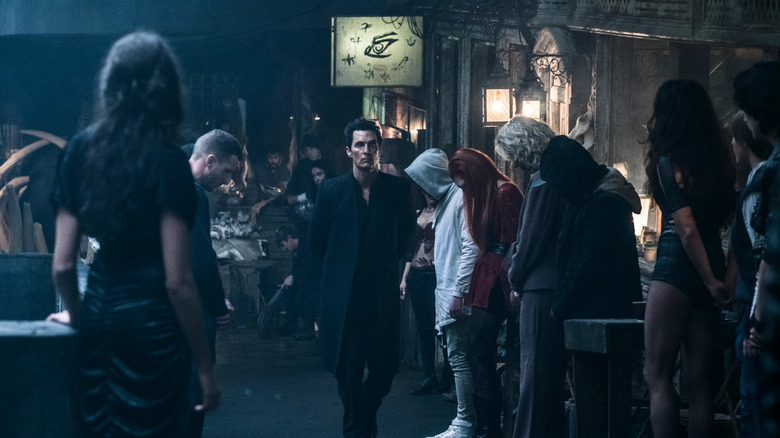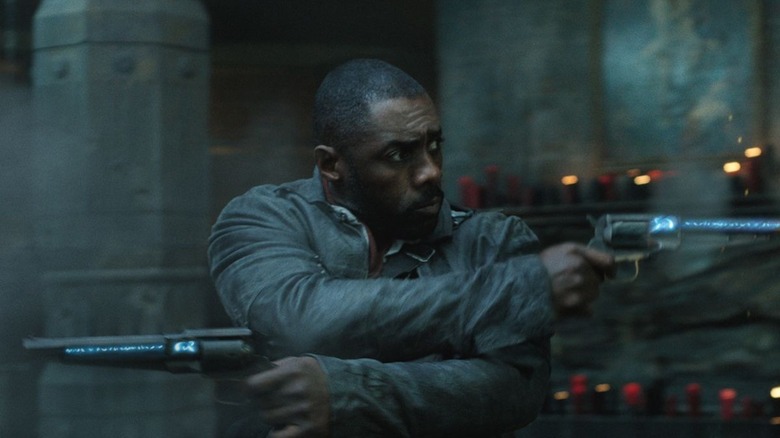Why An Adaptation Of Stephen King's The Dark Tower Series Has Never Been Successful
Since the success of "Game of Thrones," studios have been looking for a new fantasy series that appeals to adult audiences. Amazon has its "The Wheel of Time" series, Netflix has its upcoming "The Sandman," and HBO has "Game of Thrones" again. Somehow, "The Dark Tower" series by Stephen King has managed to go all this time without a proper adaptation. Even as Hollywood rushes to adapt all of King's other works, turning his short stories into TV shows and remaking his novels multiple times over, this series has been left mostly untouched.
The closest we've gotten to an adaptation was the 2017 film starring Idris Elba as gunslinger Roland Deschain, and Matthew McConaughey as the Man in Black. The movie was widely and rightfully derided, as nobody involved with the film seemed interested in capturing the characters, themes, or even the basic plot of the original book, leading King fans to wonder why they even bothered making the adaptation in the first place. It especially stings considering that the opening novel, "The Gunslinger" should've been the easiest of the series to adapt into a film, being only 200 pages long and being the only book in the series with a relatively simple plot. Amazon attempted to adapt the series into a TV show run by Glen Mazzara, but it never quite got off the ground.
Although these initial attempts to adapt the series weren't exactly inspiring, ultimately it makes a lot of sense why the books have never yet been turned into a successful TV or film series: there are a lot of weird things going on in these books, not just from a plot perspective but with the way they're structured.
Adaptation problem #1: the 600-page flashback
One of the boldest decisions Stephen King has ever made as a storyteller was with "Wizard and Glass," the fourth book of the series. After ending book 3 with a massive cliffhanger and taking six full years to get around to writing the sequel, this book does thankfully resolve said cliffhanger in an interesting, satisfying way. And then the rest of the book is made up of Roland telling the rest of his ka-tet about his tragic love story from his teen years. King spares no details; although the love story between young Roland and Susan is often considered one of the most heartfelt things King has ever written, it also meant the readers who'd been waiting six years to follow Roland's quest for the Dark Tower were treated with a fourth installment where the quest itself barely moved forward. (To add insult to injury, it would take another five years before the fifth book came out.)
This is a major storytelling hurdle any adaptation of the series will have to grapple with. How do you deal with this big flashback that puts such a long break on the main plot? Glen Mazzara's decision was to start the series with the book 4 flashback, essentially choosing to tell Roland's story in chronological order. Season 1 would end with the conclusion to his love story with Susan Delgado, season 2 would deal with the fall of Roland's home Gilead and other flashback material, and the actual beginning of "The Gunslinger" (book 1) wouldn't begin until season 3.
It's not a surprise this show never got off the ground, as this approach to the story seemed doomed to fail. There's a reason why King decided to start the series with "The Gunslinger," not "Wizard of Glass": the big narrative hook of the series is Roland learning to value emotional connections with the people around him.
Getting to know Roland, one book at a time
The first book of this series is often criticized for feeling cold, and that's by design: the Roland we meet in this book is so hardened, so focused on his quest to reach the Dark Tower, that he's barely human. He's completely closed off emotionally, to the point where even when he does form a connection with another person (the young Jake Chambers, who mysteriously died in our world and ended up in Roland's), he ends up callously sacrificing the child to achieve his own ends.
The next book is when Roland's quest finds him forced to create a team, (a "ka-tet" as the books call it), which pulls him out of his shell. He ends up in a world-hopping mission where he meets and rescues Eddie, a troubled heroin addict, and Susannah, a woman who unknowingly suffers from dissociative identity disorder. By the halfway point of book 3 ("The Waste Lands") Roland manages to redeem his earlier sin by saving Jake's life, and these characters end up forming a tight, inseparable bond.
Part of the fun of these books is watching Roland slowly open up; despite the first book taking place almost entirely from his perspective, by the time we get to the beginning of "Wizard and Glass" the reader still knows about as much about the character as Eddie, Susannah, and Jake do. This is why the massive flashback in the books works well: it's not just that it fills us in on Roland's backstory, it's that it has the reader learn the backstory along with the other characters. The main arc taking place throughout the seven-book series is the ka-tet becoming closer and closer with each other, and by erasing the communal nature of "Wizard and Glass," they would've been severely undermining that arc. The nostalgic feel of the flashback would also be lost.
Problem #2: Detta
With most novels written in the eighties, there are going to be things that don't age well. Combine that with Stephen King's self-admitted flaw of not being all that good at writing Black and/or female characters in general, and you've got yourself the weird, poorly-aged problem of Detta Holmes. See, before Susannah became Susannah at the end of "The Drawing of the Three," she was initially Odetta Holmes, a wealthy Black woman living in 1964 New York. Although Odetta herself is perfectly normal and decent, she has an alternate personality called Detta she doesn't know about. Detta is violent, sadistic, and as a minor character points out when he meets her for the first time, she "talks like a cartoon black woman."
Most of Detta's time on the page is spent shouting stuff like, "YOU AIN'T NUTHIN BUT A BUNCHA HONKY SONSABITCHES!" (a real quote from section 2, chapter 2 of the novel) and making weird sexual advances on the other white main characters. This characterization isn't quite as lazy as it probably sounds on the surface; it's implied that Detta is basically a personification of a lot of Odetta's internalized racism. Odetta grew up wealthy and disconnected from the poor and working-class Black people at the time, and Detta is acting out her childhood idea of the worst version of what society told her a poor Black person would be like. (Her personality split happened as the result of a head injury she suffered as a child.)
Although Detta is a short-lived character (the two personalities are combined into a much more stable Susannah at the end of the book), it's easy to see how someone considering making an adaptation of this series would take one look at any of Detta's scenes and think to themselves, "Yeah, I'm not touching this." There are plenty of ways an adaption could go about handling Detta, but it's going to be a challenge.
Problem #3: the Stephen King multiverse
Another challenge with adapting "The Dark Tower" series is that as the story goes on, your knowledge of other King novels becomes increasingly vital to fully appreciating what's happening on the page. There are moments in "Wizard and Glass" that only make sense if you'd read "The Stand," for instance. Father Callahan, a major character from King's second novel "Salem's Lot," shows up in the fifth book "Wolves of the Calla," and ends up being a major part of the series.
Throughout the books there are references to "The Stand" and "The Eye of the Dragon" in particular, as the villain of both novels (Randall Flag, implied to be the same person in two different universes) is a major antagonist in the "Dark Tower" series. There are also references to "It," "The Shining," "Insomnia," "Everything's Eventual," and so on. Most fans recommend that you don't read the "Dark Tower" books on their own, but that you read those other books along with them to get the full experience. This leads to some obvious storytelling dilemmas when focusing on this series, be it for a TV show or a film series: how many of these books should they reference? Before introducing Callahan, for instance, how much of "Salem's Lot" would they need to show their audience?
This all gets way more complicated when you take into account the meta aspects of the later novels. At the end of "The Wolves of Calla," the ka-tet finds a bunch of books written by some guy named Stephen King, one of which is titled "Salem's Lot." Callahan has a bit of an existential crisis at this point, realizing that a person he's never met has written a fictional book that depicts real moments from his life, including his private thoughts that no one else could've known about. He's struck with the sudden, horrifying possibility that he's a fictional character. It's a moment that nearly breaks the series.
Problem #4: the Stephen King of it all
King wasn't content to simply raise the idea that his characters are aware they're fictional characters; no, he wrote himself into the books and had Roland and Eddie talk with him. The sixth book "Song of Susannah" has Roland and Eddie showing up at Stephen King's home in Maine looking for answers, and they discover that the real story of their lives is being channeled through Stephen King by a supernatural force into a series of books. (It makes sense, trust me.) Roland and Eddie then urge King to hurry up and finish the books already, which he begrudgingly agrees to.
A big part of the seventh book, "The Dark Tower," centers around Roland and Jake's attempts to prevent Stephen King from dying in that real-life car accident that nearly killed him. Saving King's life is important to the characters because the car accident took place in 1999, and if King had died in the accident he wouldn't have been able to finish the final three books in the series, which were published in rapid succession in 2003, early 2004, and late 2004.
This was already a deeply controversial plot point in the books, but how would this work for a TV show or a movie exactly? Instead of stumbling across "Salem's Lot" the novel, does Father Callahan discover a DVD of the upcoming "Salem's Lot" movie? Are they still reckoning with the idea that they might be book characters, or are they reckoning with the idea that they're unknowingly characters on a TV show? Or would it make more sense to throw in the additional layer of them realizing they're movie characters in an adaptation of a book? Admittedly this all sounds like it'd be very interesting to watch, but it sounds like a massive headache from a screenwriting perspective. To pull this story off would require a lot of boldness on the part of the show's writers, and if the 2017 "Dark Tower" movie was any indication, boldness has been in short supply so far.
The best way to go about it?
In the end, I'd agree with Glen Mazzara in that this is a series best equipped to be adapted into a TV show, not a movie. Most of the books in this series play out in a fairly episodic manner anyway, which lends itself well to the TV medium. Unlike Mazzara's vision, I'd argue that starting with the opening page of "The Gunslinger" is absolutely vital to any successful adaptation of these books.
There's a strange misconception among a lot of "Dark Tower" fans when talking about an adaptation, however, where fans often seem to think that a TV series would have to dedicate one season to nearly every book. It's an odd assumption given how we've already seen with "Game of Thrones" and "The Expanse" that this isn't necessary. Dedicating a whole season to "Wizard and Glass," for instance, would be a death sentence for any show that cared even a little bit about keeping viewers tuned in. Roland's backstory is something that would have to be told in Lost-style flashbacks throughout the series, or given maybe one or two full episodes of focus (three episodes max) before the series moved on.
Most importantly, any TV adaptation of "The Dark Tower" should establish the core ka-tet of the series by the end of the first season. Season 1 should end at book 3's halfway point, where the ka-tet of Roland, Eddie, Susannah, Jake and (of course) Oy has fully formed. At the very least the first season should make it to the end of "The Drawing of the Three" with Roland, Eddie and Susannah working together. It's the ka-tet that makes these books shine, not just Roland, and any version of season 1 that only focuses on Roland is one that would fail to establish the tone of the series, that would fail to give viewers a good idea of what they could expect going forward.
A successful adaptation's still possible
Most fans seem to agree that HBO would be the best platform for this show, although presumably, any network that's cool with lots of violence and profanity should be good enough. Assuming the seasons are anywhere from a typical ten to thirteen episodes, it's easy to picture the first few episodes dedicated to adapting "The Gunslinger," the next three to five episodes dedicated to "The Drawing of the Three," and the final few episodes of season 1 dedicated to the rescue of Jake Chambers that takes up the first half of "The Waste Lands."
How they decide to take the show from there is anyone's guess. If they do 13-episode seasons, they could probably fit the whole thing into three tightly-paced seasons and maybe avoid the complications of Jake's actor growing up too fast. Or they could take a cue from "American Gods" and slow things down a little more. The first season of "American Gods" in particular did an amazing job of expanding every detail of the book to make for compelling TV.
Although Mazzara's TV adaptation was a bust, the fact that it stayed in development hell for so long shows that Hollywood producers are at least aware now that "The Dark Tower" is a series best suited for television, not film. And in a way, the failure of the Mazzara's series is a blessing in disguise: whereas Mazzara's show was developed in the shadow of the massive failure of the movie, by now enough time has passed that everyone has forgotten that the movie ever existed.
There's no news yet of any upcoming attempt at a "Dark Tower" adaptation, but a successful one down the line is definitely still possible. The book series may be weird, uneven, and seemingly alienating to mainstream audiences, but if the success of "Dune" last year was any indication, audiences may be more open to this kind of thing than you'd think.
